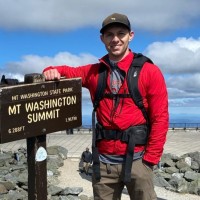Politics and International Relations

Sam Brenner ’13
Senior Ocean Procurement Associate at Flexport
Our new Alumni Spotlight is a series that shares the stories, successes, and student memories of our talented and inspirational alumni. This month we had the pleasure to hear from the Class of 2013, Sam Brenner, Senior Ocean Procurement Associate at Flexport.
Major(s) at Ursinus:
International Relations
What do you currently do?
I’m a data product manager at a company called Flexport. Flexport is a technology company in the international logistics space that helps companies transport their products and materials between countries. Flexport also helps deliver aid in humanitarian operations and is currently helping to deliver relief aid to the millions of refugees displaced by the conflict in Ukraine. My job is to help build digital tools to guide strategic procurement and pricing decisions in the ocean freight market.
Prior to Flexport, I spent 5 years in the Marine Corps serving as an infantry officer. While in the Marine Corps, I served in the staff-group of a four-star general at the Pentagon, led an infantry platoon on deployment to South East Asia, and commanded a training company at the Marine Corps School of Infantry.
What is the most rewarding part of your job?
Working at Flexport gives me the opportunity to solve complex problems with huge impact. Using software and Design Thinking we can dramatically improve the way goods flow through supply chains. The economic and environmental implications are just massive: roughly 90% of everything that is bought in the United States was imported at one stage or another. Also, 30% of all carbon emissions in the US come from transportation. The pandemic has definitely made things more difficult but it’s incredibly rewarding to be working on solutions for such difficult and urgent issues.
How do you see the connection between the time you spent as a IR major and what you’ve been able to do since?
I didn’t plan it this way, but both the Marine Corps and Flexport have given me a front row seat to watch the real-world implications of international relations. While working at the Pentagon, I worked on official correspondence with foreign military leaders and diplomats. I learned how integral military strength is to our foreign policy. I also saw this play out while participating in bi-lateral training exercises with our military allies abroad. During a particularly tense period of relations with North Korea, I was actually on an aircraft carrier several miles off the Korean coastline acting as a deterrent force. International Relations can take you to some interesting places!
When I started at Flexport, President Trump was initiating a trade war with China. It was fascinating to see how tariffs and trade negotiations can impact international trade flows in real-time. It was also interesting to see the second and third-order impacts of events like Brexit and the international responses to the pandemic. Many people don’t know this, but the United Nations also plays a big role in international trade with the International Maritime Organization (IMO). The IMO helps regulate the ocean freight industry which operates largely outside of the jurisdiction of national governments. There are many valid reasons for people to criticize the UN, but I think the IMO is a great example of both the importance and potential for international governing bodies.
What advice do you have for students currently majoring in, or considering to major in Politics or IR?
If you are passionate about International Relations, get some real-world experience working at a large government agency or NGO; it doesn’t have to be the State Department. So much of policy is actually the unintended result of bureaucratic process. To be effective, you need to know how these institutions work in the real world. The future of humanity depends on these institutions working! When I worked at the Pentagon, the people I met with the most interesting and impactful careers always had lots of experience “in the field.” That could be as a military attache, a humanitarian NGO, or working on Capitol Hill. It was their experiences, not their Fukuyama or Weber critiques that led them to action. These were also the people with the best stories!
What is one of your favorite memories, classes, professors, or activities while attending Ursinus College as a student?
My favorite memory is of making new friends in those first few weeks of Freshman year in BPS. One of those friends ended up becoming my amazing and inspiring wife, Ryan. We were so lucky to have many other Ursinus friends help us celebrate at our wedding last October. I’ll always remember the fun times we had on campus together and I look forward to many more Ursinus reunions in the years to come. Go Bears!